- Home
- Alyson Noel
Dreamland Page 7
Dreamland Read online
Page 7
With the blond hair, blue eyes, and pasty pale skin, he wasn’t all that different from me—and yet, his features seemed so exaggerated, so startling and unexpected, I couldn’t decide if he looked like an angel …
Or more like its opposite.
I froze, unsure what to do. But before I could do much of anything, he’d already jumped from his chair, already moved to the place where I stood.
A couple of distressed pieces of wood the only things standing between us, as he placed his hands on his hips and said, “You’re not supposed to be here.” His voice was much higher than I would’ve expected, but deadly serious nonetheless.
I nodded. There was no use denying what we both knew was true.
“No one’s supposed to be here after closing.”
I shrugged, folded my arms across my chest, and peered past his shoulder. Trying to think of something to say that might get him to lighten up, let me hang around for a bit, at least until the darkness went away.
But the second I met his eyes, I knew those words would never come. There was something very odd about him, something I couldn’t quite put my finger on.
“Usually the dark does the trick. It’s enough to keep all the stragglers away. That’s the whole point, you know. That’s why it happens. And yet, here you are.”
I bit down on my lip, did my best to hold on to his gaze.
“I guess you don’t scare easily, then?”
I squared my shoulders, recognizing a challenge when I heard one. Clearly he had no idea just who he was dealing with, and maybe it was time that I told him—heck, maybe I should even show him.
Big bad ghosts were my specialty. I’d already dealt with quite a few. From what I knew, the really bad ones were all lingering down on the earth plane, so how bad could this blond kid be if he was hanging out Here, in some old, abandoned soundstage?
I was tempted to roll my eyes, but I made myself refrain. Figuring at best, he was just some silly wannabe—at worst, he actually thought he could scare me.
Puh-leese.
“Yeah, I get it.” He looked me over carefully. “Fear is for sissies, right?”
I looked at him and shook my head. I’d been so distracted by my own thoughts, I wasn’t sure if I’d heard him right.
“What?” I squinted, taking him in, or at least what the slats allowed me to see. Not getting much more than a glimpse of a crisp, white shirt that was worn with the kind of pants, belt, and shoes my dad used to wear for important meetings at work. Shaking my head yet again at how some of these ghosts continued to dress despite the fact that they could manifest whatever they wanted.
But he just smiled, removed a few slats, and waved me right in. Motioning for me to crouch low so I wouldn’t hit my head, then he replaced those slats again. “I asked if you were here about a dream,” he said.
I stood before him, pretty sure that’s not at all what he’d said. But thinking he might be able to help, that if I played it just right, then I might still get what I came for, I decided to let that one go.
“You know, come to think of it …” He paused, his grin growing wider. “I could use a little help around here. So, how about you help me with my dream jump, and then I’ll help you with yours. Deal?”
He extended his hand, waiting for me to shake it.
So I did.
I ignored my better instincts and clasped it in mine.
15
He told me his name was Satchel.
Satchel Alexander Blaise III.
And I stood right before him, listening to him recite it, completely impressed.
The name sounded weighty. Important. Like he might descend from royalty or something.
But Satchel just shrugged. Assured me it was just a name that’d been passed down in the family until it was his turn to wear it, not so different from a hand-me-down shirt.
Assured me that it didn’t mean much of anything, so I shouldn’t attach too much meaning to it.
There were other things that mattered more.
“Much more,” he said.
“Yeah, like what?” My gaze pored over him, hoping the answer might help me get to know him a little better, might prove that there was nothing to be afraid of, that he was really no different from me.
Hoping that it might rid me of the creepy, nagging feeling that had stirred up inside me ever since I made my way in and grasped his hand in mine.
But he just shrugged again, saying, “We’ll get to that later. First, I need help with this dream.”
He led me deeper into the room, and finally I saw where that strange and flickering light had originated. He had some antique projector rigged up in the back that pointed toward a big, stained old screen—its corners all yellowed and curled, with a series of rips and tears that crept along the bottom seam.
“What’s this?” I asked, thinking this room was so much smaller than the one I’d done my practice jumps in, and wondering why he was using such old, outdated equipment when there was shiny, new, modern stuff to be had, if not manifested.
“New is not always better.” He glanced at me, fiddled with the cuffs of his sleeves. “This works just as well, and besides, it’s authentic.”
I stopped right there, refusing to take another step closer. “Authentic to what, exactly?” My hand on my hip, my lips screwed to the side, needing a bit more to go on.
He huffed, patted his hair with the palm of his hand—smoothing a haircut that wasn’t just totally and completely outdated, but that also looked as though it was whipped into obedience with superglue and spit.
“Authentic to Dreamland,” he said. “This, all that you see before you, it’s all of the original equipment. It’s what they used to use before …” He paused, then, shaking his head, decided to leave it right there.
Though I wasn’t about to let him off so easily. If he needed help, then I needed answers, despite whatever deal we may have struck just a few moments earlier.
I narrowed my eyes, fixed him with my most serious, stoniest stare. Watching as he sighed, threw his arms in the air, and said, “This is the stuff they used to use before things changed around here. This is all the original equipment that …”
And that’s when I knew. Knew it before the words left his lips.
His eyes locked on mine as he confirmed the thought in my head.
“This is the stuff the dreamweavers used back in the day.”
Dreamweaving.
According to the gate guard, Mort, and most definitely Balthazar, dreamweaving was not done in these parts anymore. Heck, I’d gotten a major case of the stink-eye just for making an accidental mention of it.
I looked at Satchel, my eyes growing wide. But he just smiled, his face radiant, almost angelic, when he said, “Trust me, once you weave a dream, you’ll never want to dream jump again.”
16
“The secret to dreamweaving is to keep the ingredients as organic as possible. It needs to come off as real and authentic, otherwise the dreamer will wake and the message will fail. With dreamweaving you have to make it seem like something the dreamer would’ve come up with by themselves—something they’d never even guess was not their own creation. Dreamweaving is all about leaving a big impression. It’s all about the impact you make.”
I nodded, committing his words to memory, wondering if I should maybe manifest myself a small notebook so I could scribble it down, just like Balthazar had done with my backstory.
“Don’t get me wrong,” Satchel said, nodding at me. “You can use all the monsters, dragons, witches, warlocks, fairies, werewolves—whatever fantasy creatures you like—as long as it’s real to the dreamer—as long as it’s part of their experience, part of their world. As long as it’s something they either secretly, or not so secretly, believe in. If it’s real to them, then it’s fair game. It’s all about knowing the dreamer. Knowing what they care about … what they desire … what they fear. Or, in many cases, what they overlook.”
I squinted, wondering how he coul
d possibly know all of this. But just as soon as I’d completed the thought, he smiled and said, “I studied under Balthazar.”
I gasped, wondering how that could possibly be when I figured him for the same age as me. And then it hit me—maybe he was the same age as me.
Maybe he had been the same age as me for a very long time.
Maybe there was no way to grow and mature.
Maybe Bodhi had lied about all that in an attempt to get me to shut up and stop complaining about being eternally twelve.
Maybe we really were stuck.
Maybe I’d live Here for infinity and nothing about me would change!
“I was his number-one intern,” Satchel said, invading my thoughts, but I was happy to let him, they were putting me into a serious mental tailspin. “I was the best assistant director Dreamland ever saw …”
“And then?” I gulped, eager to hear what came next.
He shrugged, patted his hair, a gesture he’d done twice in the short time I’d known him, and I wondered if it was his own personal nervous tell.
“And then …” He paused, tugged at the cuffs on his shirt (another tell?), took way too much time inspecting his sleeve, pretending to remove a nonexistent piece of lint. “And then, we had a disagreement.” He shrugged. “A sort of … falling out, if you will. And now Balthazar does what he does—dream jumps—and I do what I do—dreamweaving. Trust me, Riley, my way is better. You’re lucky you found your way here. Balthazar has talent, there’s no doubt about that. But what he lacks is vision. And whether you’re directing a dream, or a movie, or even a play you put on for you parents and your dog in your garage …”
He looked right at me, and I wondered how he could possibly know about that, how he could possibly know about Ever’s and my Rainy Day Productions—that’s what we called our theater company, we even made brochures to go with it. But then he just smiled again, and I began to relax, figuring lots of kids did stuff like that. It was an easy guess on his part.
“Anyway,” he continued, reclaiming my attention. “No matter what sort of production you’re directing, vision is everything.”
I looked at him, remembering how Balthazar had claimed that the imprint was everything, and that the landing came a close second. Clearly they worked from two very different perspectives.
“What Balthazar does is nice, don’t get me wrong,” Satchel continued. “And it definitely serves a purpose, there’s no doubt. But, as you’re about to see, there’s just no comparison. His stuff … well, it’s a little schmaltzy. A little … sappy. Too many rainbows and smiling puppies for sure. His stuff is dripping with sugar, and spice, and everything nice. Overly sentimental in the most obvious way.” He grimaced, making clear his disapproval, his distaste. “It’s not near as important as the work I do here. The same work you’ll soon be doing here too. What I do changes lives, Riley. After one of my dreamweaves … well, let’s just say that the dreamer’s life is never quite the same. They begin to see their place in the world in a whole new way.”
I looked at him, wondering if Balthazar knew he was here, wondering if anyone knew he was here.
“So, what do you say we get started?” he said, not allowing me enough time to reply before he added, “Oh, and just so you know, there is no dream jumping here. There’s no need for it. What I do covers everything.”
“So, how do you do it?” I asked, more intrigued than anything. Following the curve of his arm, all the way down to the tip of his slim, pale finger as he pointed toward a dark, empty stage with the stained screen right behind it.
“For starters, you need to head over there. Stand right on your mark. You’ll see it when you get there. And then I’ll start the projector, and you just sort of … go with it. Remember how you did with the dream jump? Well, that part’s the same. You just keep on acting no matter what. You stay in character until I tell you to stop. Deal?” He looked at me, looked directly into my eyes, and all I could do was nod in reply.
That was the second time he’d used the word “deal.” And while I liked it even less than the first time, for some reason, I didn’t hesitate to do what he said. It’s as though his gaze alone was compelling me forward. Like I no longer controlled my own will. But what was even stranger is that I didn’t seem to care. I only wanted to please him, to get a good review.
“Like this?” I asked, my voice too high, my smile too bright. “Is this the right spot?” Knowing it was. The X was clearly marked. And yet, I couldn’t help but seek his approval, even if it took a little begging on my part.
He nodded, face squinched in deep concentration as he peered between the viewfinder and me, saying, “Now remember, it’s like Balthazar taught you. Just go with the scene you find yourself in. Adapt and blend in, no matter what I put before you, no matter what the situation. Just do whatever it takes to make sure the dreamer stays in the scene too. The last thing we want is for them to wake up before the dream is complete. There’s a very important message attached, I don’t just make this stuff up for my own entertainment, you know. But, it’s imperative they experience the whole, entire dream. It’s imperative that they don’t wake prematurely. Otherwise, the message will be lost.”
I nodded, staring at my feet, making sure they didn’t stray from the mark. Then my eyes flicked toward the screen and I focused as hard as I could. Body on edge, senses on high alert, waiting for an image to appear, waiting for my cue to begin.
The first thing I heard was the odd click and whir as the film reel circled. Then the screen went pitch-black, but only for a second before it lit up again, bearing an image of an old Indian wearing a headdress perched above a series of circles containing a bunch of seemingly random numbers. I squinted, trying to think of where I’d last seen that, and then I remembered, it was an old TV test pattern. Back on the earth plane, my friend Emily’s brother had a T-shirt with the exact same picture on it.
And then, just like that, the next thing I knew the screen lit up with the most spectacular thunder and lightning show, and I stood there in awe, happy to watch, and feeling pretty thankful it remained on the screen, that it wasn’t actually raining on me.
Though unfortunately, the thought came too soon, and the next thing I knew it was raining for real. Like taking a ride through the car wash in a convertible with the top left down, a torrential downpour completely drenched me.
When the lights up above started to sizzle and crack, their bulbs popping and flaring as though they might electrocute me, I took to the ground and ducked my head low. Doing what I could to shield myself with my hands by grasping them tightly over my head, silently reciting the facts as I knew them: The Here & Now didn’t run on electricity—it was just some kind of special effect—part of the dream Satchel was weaving—there was no way any of it could harm me.
I peered toward him, knowing better than to look at the camera, much less at the director, while in the middle of shooting a scene, unless, of course, you were directed to. But still I glanced his way, squinting through steady ribbons of water raining down all around me, hoping for a little direction, a little approval—looking for some indication of where this scene might be heading, and just how long I’d be required to put up with this—but not getting much of anything.
Satchel was absorbed. Having moved away from the projector, he’d perched himself behind a big, old-timey computer where he punched furiously on its keyboard. No longer taking notice of me—his lack of attention left me feeling really sad and empty.
I wanted him to notice, to approve of my acting, to applaud my hard work. I wanted him to cast me in all of his future productions, give me the starring role. I really, really, really wanted him to be proud of me.
Though, I had no idea why.
My mind began to ponder, wondering why some weird kid’s approval was worth getting drenched over. And just as I began to grab hold of myself, questioning why I was staying, if I might not be better off leaving, I heard panting.
Heavy, frantic, grunting and panting.
/>
Then a second later I realized it came from the girl running toward me.
The girl running toward me with the filthy, ripped-up clothes, stringy, wet hair, and terrified face.
I started to shout. Decided I’d play the part of a Good Samaritan—or a hero even. I started to tell her not to worry, that I was there to help. But the second I opened my mouth, the words all backed up in my throat.
Sticking.
Clogging.
Like a drain all jammed up with gunk.
My toes were sinking. The shoes I once wore were no more. Everything had changed.
Every. Single. Thing.
I was no longer standing on a stage. The black painted wood that had, just a moment before, been supporting me, had turned into something very different—something I once saw in a really old movie.
Sandy, soggy, and swampy—I immediately recognized it as quicksand. And I knew if I didn’t move fast, in no time at all it would swallow me whole.
With the scream still lodged in my throat, I did my best to run. But every step forward was a useless endeavor. The sand was too quick, too deep. It was dragging me down—sucking me in, forcing its way up to my nose and into my mouth.
But if I thought I had it bad, well, that was nothing compared to the girl. Not only was she sinking up to her neck, but a whole team of alligators had appeared out of nowhere. Their powerful, crunching jaws yawning open and snapping shut as though it was a warm-up, as though they were preparing to devour her.
I freed my hand of the muck and lurched toward her. Urging her to lean toward me, to take hold if she could. I tried to smile, tried to nod in encouragement, to give her a reason to fight, to not give up until we’d exhausted every last resource. Watching as she thrust her body toward mine, the alligators charging, snapping, chomping on air, hoping to soon replace it with pieces of her.
And then, just when she was near, just when our fingers met and she’d grabbed ahold of me, a searing hot flame tore through her flesh, giving me no choice but to let go.
I couldn’t help it—it just sort of happened—it was a reflex—it wasn’t my fault! And when I tried to reach her again, it was too late.

 Shimmer
Shimmer Art Geeks and Prom Queens
Art Geeks and Prom Queens Radiance
Radiance Evermore
Evermore Echo
Echo Infamous
Infamous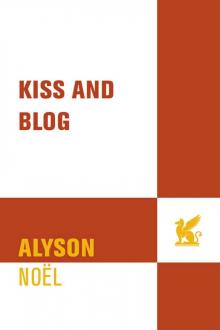 Kiss & Blog
Kiss & Blog Daire Meets Ever
Daire Meets Ever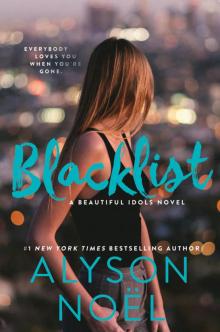 Blacklist
Blacklist Blue Moon
Blue Moon Shadowland
Shadowland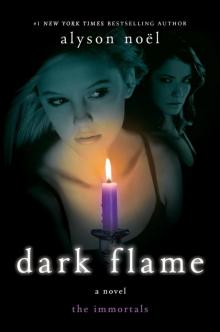 Dark Flame
Dark Flame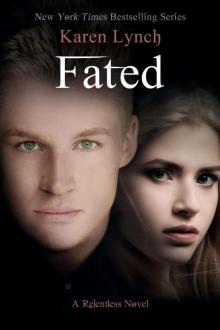 Fated
Fated Cruel Summer
Cruel Summer Night Star
Night Star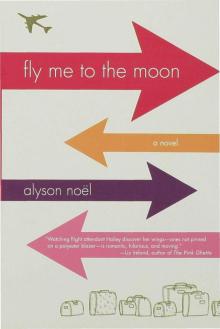 Fly Me to the Moon
Fly Me to the Moon Unrivaled
Unrivaled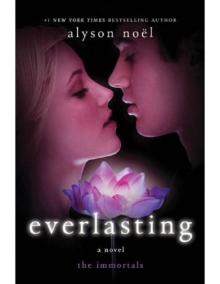 Everlasting
Everlasting Whisper
Whisper Echo (Soul Seekers)
Echo (Soul Seekers)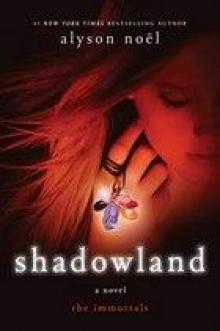 Shadowland: The Immortals
Shadowland: The Immortals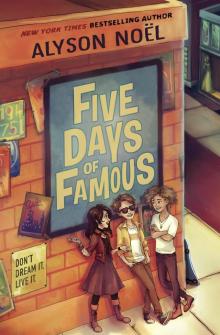 Five Days of Famous
Five Days of Famous Saving Zoe
Saving Zoe Dreamland
Dreamland The Soul Seekers: Horizon
The Soul Seekers: Horizon Keeping Secrets
Keeping Secrets Shimmer rb-2
Shimmer rb-2 Evermore ti-1
Evermore ti-1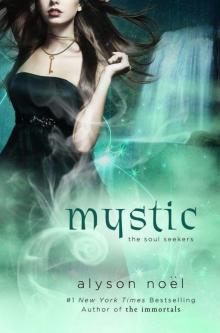 Soul Seekers03 - Mystic
Soul Seekers03 - Mystic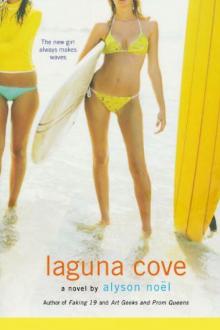 Laguna Cove
Laguna Cove Shimmer: A Riley Bloom Book
Shimmer: A Riley Bloom Book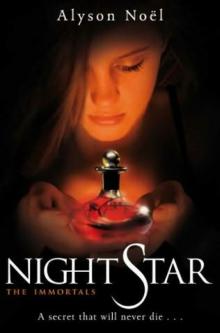 Night Star ti-5
Night Star ti-5